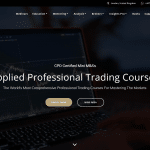A regulated forex broker is a trading firm that holds a licence from a recognised financial authority, such as the FCA (UK), ASIC (Australia), or CySEC (Cyprus), and complies with strict operational, financial, and ethical standards. For retail and professional traders alike, regulation is a critical factor when choosing a broker—it directly impacts fund safety, transparency, and legal recourse.
What Is a Regulated Forex Broker?
A regulated forex broker is authorised to operate under the supervision of a government or independent financial regulator. These brokers:
- Must hold segregated client funds
- Are subject to capital adequacy requirements
- Must undergo regular audits and compliance reviews
- Provide dispute resolution mechanisms
Examples of Trusted Forex Regulators
| Regulator | Region | Licence Prefix | Authority Type |
|---|---|---|---|
| FCA | United Kingdom | FRN | Top-tier |
| ASIC | Australia | AFSL | Top-tier |
| CySEC | Cyprus | CIF | Tier 2 |
| DFSA | UAE (Dubai) | F000xxxx | Tier 2 |
| FSCA | South Africa | FSP | Tier 2 |
| NFA/CFTC | United States | NFA ID | Top-tier |
| MAS | Singapore | CMS | Top-tier |
| IIROC | Canada | NA | Top-tier |
Why Regulation Matters for Forex Traders
1. Fund Security
Regulated brokers must keep client money in segregated accounts, protecting your funds if the broker becomes insolvent.
2. Transparent Pricing
Authorised brokers are required to provide best-execution policies, disclose spreads, and publish risk warnings.
3. Leverage and Risk Limits
Regulated brokers follow local leverage caps (e.g. 1:30 under ESMA), helping protect traders from excessive risk exposure.
4. Legal Protection
In case of disputes, regulators offer recourse through formal complaint procedures, mediation services, or compensation schemes.
5. Prevention of Fraud
Regulated brokers must meet strict anti-money laundering (AML) and know-your-customer (KYC) standards, reducing scam risk.
How to Check if a Forex Broker is Regulated
Step-by-Step Verification:
- Find the broker’s licence number (usually at the bottom of their website)
- Visit the regulator’s official site (e.g., FCA Register)
- Search using the company name or licence number
- Ensure the licence is active, not expired, withdrawn, or suspended
- Confirm that forex/CFD trading is authorised under that licence
✅ Traders report that verification via the official database is the most reliable method, especially when offshore clones or fake licence numbers are used.
Regulated vs Unregulated Brokers
| Feature | Regulated Broker | Unregulated Broker |
|---|---|---|
| Regulation | Yes | No |
| Segregated Funds | Yes | Not guaranteed |
| Leverage Limits | Yes (by region) | Often unlimited |
| Legal Protection | Yes | None |
| Scam Risk | Low | High |
| Withdrawal Disputes | Resolvable via regulator | Often ignored |
Common Red Flags of Unregulated Brokers
- No licence number or fake regulator logos (e.g., “IFMRRC”)
- Pushy sales tactics, bonus schemes, or guaranteed profits
- Use of crypto-only funding or third-party wallets
- Suspicious withdrawal delays or hidden fees
Key Takeaways
- A regulated forex broker is far safer than an unregulated one
- Top-tier regulators enforce fund segregation, audits, and legal protection
- Always verify broker licences via official government registries
- Regulation reduces risk, but does not guarantee profits or prevent losses
- Avoid brokers operating under shell entities or unverified jurisdictions
Frequently Asked Questions
What is a regulated forex broker?
A regulated forex broker holds a valid licence from a recognised financial authority and follows strict compliance, fund segregation, and transparency rules.
How can I verify if a broker is regulated?
Check the broker’s licence number on the regulator’s official website, such as the FCA, ASIC, or CySEC register.
Are regulated brokers always safe?
Regulation reduces risk significantly, but traders should still perform due diligence on execution quality, platform reliability, and terms.
Can I trust brokers regulated in offshore jurisdictions?
Brokers licensed in Seychelles, Belize, or SVG offer less protection than those regulated by top-tier authorities like the FCA or ASIC.
What’s the difference between top-tier and offshore regulation?
Top-tier regulation includes strict client fund protection and legal recourse, while offshore regulation often lacks enforcement and transparency.




Leave a Reply
Please log in or register to share your thoughts.